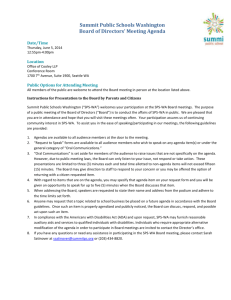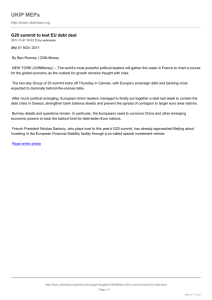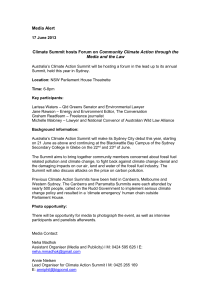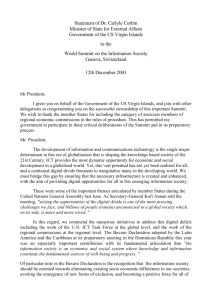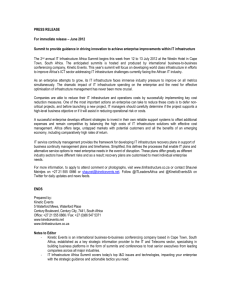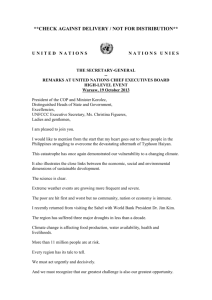G7 and G8: stages of evolution
advertisement
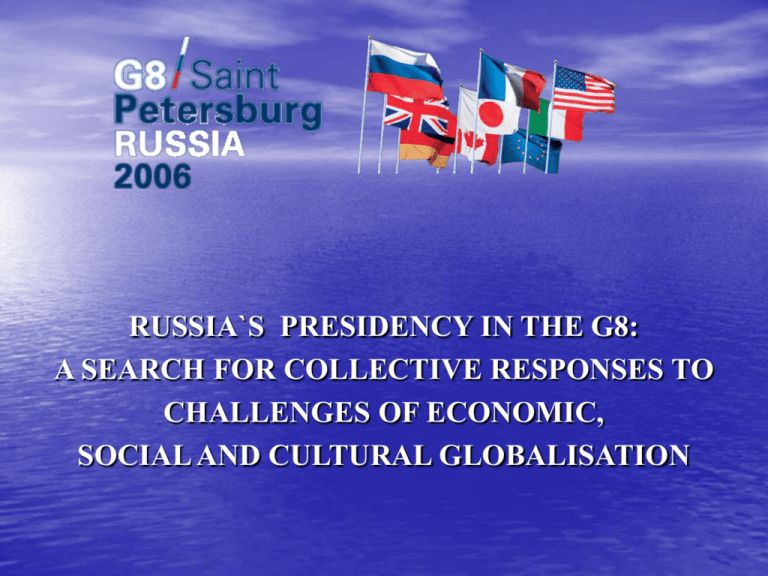
RUSSIA`S PRESIDENCY IN THE G8: A SEARCH FOR COLLECTIVE RESPONSES TO CHALLENGES OF ECONOMIC, SOCIAL AND CULTURAL GLOBALISATION Unique features of G8 Unparalleled concentration of power and influence: 4 nuclear powers and 4 UNSC permanent members 49,8% of the world GDP 49% of the world trade 49,6% of the IMF quota G7 and G8: stages of evolution 1975 – 1979: from the Rambouillet summit to the second energy crisis Core agenda of G7 is defined: international trade, economic growth, development assistance, energy security of the Western world Comprehensive strategy is agreed (1978 Bonn summit) 1979 oil crisis explodes the Bonn strategy. 1980 – 1990: from the energy crisis to "velvet revolutions" in Eastern Europe Venice declaration (1980): fighting inflation and resolving energy crisis. First working body of the G7 is established (in 1980; High-level Group on G7 energy strategy) Financial coordination strengthened (1985 Plaza Accord and 1987 Louvre Accord) G7 is turning to its domestic problems (structural change in economy and labor force discussed at 1988 Toronto summit) Third world debt reduction process begins: "Toronto conditions“ G7 strategies towards "velvet revolutions" and Soviet perestroika are defined (1989-1990) 1991 – 1997: from collapse of the Soviet Union to the emergence of G8 Evolution of Russia's position vis-à-vis G7: from guest status to the "Political G8" and G8 membership (except some financial issues) G7/G8 agenda is becoming more political, social and environmental Reform of the G7/G8 begins (UK Prime Minister John Major's letter of August 1992) G7 reacts to the 1995 Mexican financial crisis. Reform of IMF, WB and UN socioeconomic institutions 1996 Moscow summit on nuclear security: a break-through in the evolution from G7 to G8 Counter-terrorism becomes a major issue (1995 – G8 Expert group on terrorism is established; ministerial conference on counter terrorism is held) Globalisation becomes a permanent issue of the G7/G8 agenda ("Making a success of globalisation for the benefit of all" - 1996 Lyon summit) 1998 – 2001: from the Asian financial crisis to 9/11/2001 1997 Denver summit: G8 is formed (except some financial issues) Africa becomes permanent item of G7/G8 agenda (since 1997 summit) G8 assists in resolving Kosovo crisis (1999) HIPC initiative is launched (1999 Cologne summit) Conflict prevention and resolution is discussed (in the aftermath of the Kosovo crisis) From 2001 to the present Key context factors: - globalization becoming the major trend of world development; - importance of socio-political issues in the G8 agenda is growing (employment, poverty, healthcare, life-long education); - global and transnational problems are exacerbated: ecology, crime and international terrorism; - general financial and economic situation of G8 members is differentiated; - new global economic players come to the scene: China and India; - risk of financial crises in some Third world regions persists; - Republican administration is elected in the US; - President Vladimir V.Putin is elected in Russia Principal spheres of G8 action Contributing to UN Millennium summit goals (fighting poverty in the Third world through debt reduction; facilitating access to G8 markets; increasing volume and efficiency of ODA; Global Fund; assisting implementation of the Education For All Program; helping to overcome "digital divide") Fighting international terrorism: preventing terrorists' access to WMD; enhancing transportation security; cutting terrorists' financial flows Decision to include Russia in the G8 rotating presidency cycle (2002 summit) Outreach becomes permanent (2002 summit – NEPAD leaders; 2003 summit – 13 leaders of Asian, African and Latin-American countries; 2004 summit – Greater Middle East leaders; 2005 summit – leaders of key emerging economies) Nuclear non-proliferation becomes an urgent issue (Iran, DPRK) G8 functions in the international system G8 as a modern "Concert of nations"? G8 as a conspiracy of the rich? G8 as an international interest group at the global level? Central function: regulating a (limited) number of financial, economic, political and social processes in the international system; stimulating evolution of the system Supporting functions: Building confidence among G8 leaders through regular personal contacts Facilitating identification of common interests on specific problems and harmonizing approaches to them (Medium-term economic policy in early 1990's; HIPC) Elaborating framework rules of behavior for G8 members and initiating elaboration of universal rules (MTCR, Wassenar regime, conventions on fighting international terrorism) Preventing/resolving crises (energy crisis of 1979; Mexican and Asian financial crises; Kosovo crisis). G8 levels of interaction G8 summit Ministerial meetings: - Foreign affairs - Finance - Justice and Interior - Environment - Science and technology ("Carnegie group") - International development assistance Sherpa meetings Foreign affairs sous-sherpa meetings Finance sous-sherpa meetings G7 deputy ministers of finance meeting Political directors meeting Senior official and experts meeting: High level group on non-proliferation. Supervises the following groups: - experts group on non-proliferation - working group on Global Partnership - nuclear safety group Counterterrorist action group Experts group on terrorism (Rome group) Senior experts group on organized crime (Lyon group) Working group on biometrics in ID Personal representatives group for contacts with Africa Group of representatives of National agencies for development assistance Senior officials group on labor and social issues Experts group on Afghanistan Experts group on SALW control in Africa Experts group on peacekeeping capacity building in Africa Russian presidency in G8 50-60 events as a run-up to the St.-Petersburg summit (July 15-17, 2006) 10-11 February – ministers of finance meeting (world economy, oil markets, WTO round, financing fight against dangerous diseases, development assistance, restructuring third world debt) 15-16 March – energy ministers meeting: energy security problems to be discussed 24-25 April – health ministers meeting 1-2 June – education ministers meeting 3-4 June – science and technology ministers meeting 15-16 June – interior and justice ministers meetings 29 June – foreign ministers meeting Russian presidency outreach 17-18 June – G8 Youth meeting 13-14 June – G8 Civil society meeting Post-summit events September 2006 – G8 parliamentary conference October – labor ministers meeting 27-29 November – International forum on business community contribution to the fight against terrorism Key initiatives of the Russian G8 presidency Enhancing energy security Fighting dangerous infections Promoting professional training Energy security initiative Strategic goal: ensuring secure supply of world economy and population with all kinds of energy at acceptable prices with minimum damage to the environment and based on the balance of interests of producers and consumers of energy resources. Spheres of action: - strengthening stability and predictability of international energy markets; - increasing investments in the world energy sector; - promoting energy saving and energy efficiency; - developing alternative energy sources; - enhancing safety and reliability of world energy supply; - reducing "energy poverty" of the Third world Initiative on fighting dangerous infections Strategic goal: strengthening WHO global network for information and analysis of infectious diseases. G8 Action plan on bird flu and its pandemics among humans Measures to prevent epidemics related to natural disasters Initiative on education Strategic goal: improving quality of university education in G8 countries and in the Third world. Spheres of practical cooperation: - modernizing certification mechanisms for the "new economy" and global labor markets - adaptation, professional, linguistic and cultural integration of migrants Other 2006 summit issues Regional conflicts: Middle East, Iraq, Afghanistan State of world economy and financial system Finalizing Doha round of WTO negotiations; Russia's accession to WTO Fighting narcotraffic and international terrorism: problem of Afghan drugs and of diffusion of extremist/terrorist ideologies through mass-media Non-proliferation: strengthening international guaranties of access of non-nuclear states to peaceful nuclear energy Peace-keeping in Africa Development assistance.
